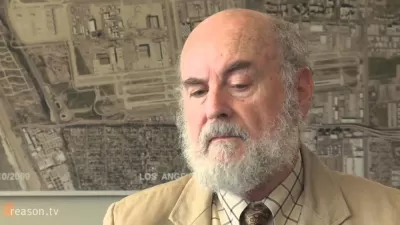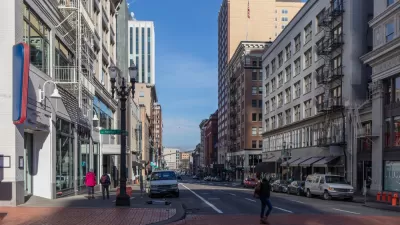USDOT employees, who are required to go back to the office, will receive free parking at the agency’s D.C. offices — flying in the face of a growing research body that calls for pricing parking at its real value.

In a nod to the late, great Donald Shoup, Kea Wilson argues that the U.S. Department of Transportation’s free parking initiative will “encourage driving by employees who otherwise would take transit — and inflict more congestion, emissions, and traffic violence on surrounding communities.”
Parking spots at the USDOT’s Washington office that once cost $155 per month will now be free and distributed through an annual lottery — including spaces once reserved for people with disabilities, carpoolers, and people who use their vehicles for work. “That policy, which may violate federal law, also runs runs counter to the District's own policies to encourage more sustainable commuting and curb the deleterious effects of cars in the nation's dense, transit-rich nation's capital,” Wilson asserts.
According to Daniel Herriges of the Parking Reform Network, “There are a handful of places in North America that basically would cease to function if everybody who works there drove in every day ... and I would say that the core of Washington, D.C. is absolutely one of those places.”
Although a 2022 law mandates that D.C. employers with over 20 employees provide parking cash-outs to employees who don’t drive to work, companies and organizations with their own parking lots, like USDOT, were exempt — “removing a powerful incentive for employers in transit-rich neighborhoods to stop offering parking to anyone and putting their lots to more productive use.”
FULL STORY: The High Cost of Free Parking: Duffy’s Parking Giveaway Will Cost the Rest of America

Maui's Vacation Rental Debate Turns Ugly
Verbal attacks, misinformation campaigns and fistfights plague a high-stakes debate to convert thousands of vacation rentals into long-term housing.

Planetizen Federal Action Tracker
A weekly monitor of how Trump’s orders and actions are impacting planners and planning in America.

Chicago’s Ghost Rails
Just beneath the surface of the modern city lie the remnants of its expansive early 20th-century streetcar system.

Bend, Oregon Zoning Reforms Prioritize Small-Scale Housing
The city altered its zoning code to allow multi-family housing and eliminated parking mandates citywide.

Amtrak Cutting Jobs, Funding to High-Speed Rail
The agency plans to cut 10 percent of its workforce and has confirmed it will not fund new high-speed rail projects.

LA Denies Basic Services to Unhoused Residents
The city has repeatedly failed to respond to requests for trash pickup at encampment sites, and eliminated a program that provided mobile showers and toilets.
Urban Design for Planners 1: Software Tools
This six-course series explores essential urban design concepts using open source software and equips planners with the tools they need to participate fully in the urban design process.
Planning for Universal Design
Learn the tools for implementing Universal Design in planning regulations.
planning NEXT
Appalachian Highlands Housing Partners
Mpact (founded as Rail~Volution)
City of Camden Redevelopment Agency
City of Astoria
City of Portland
City of Laramie




























